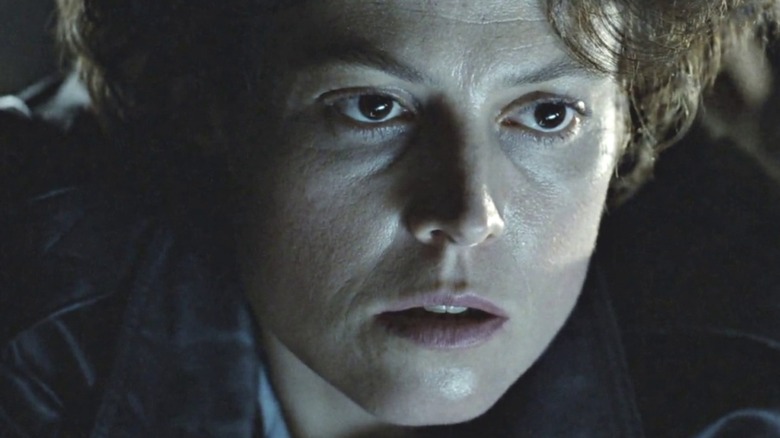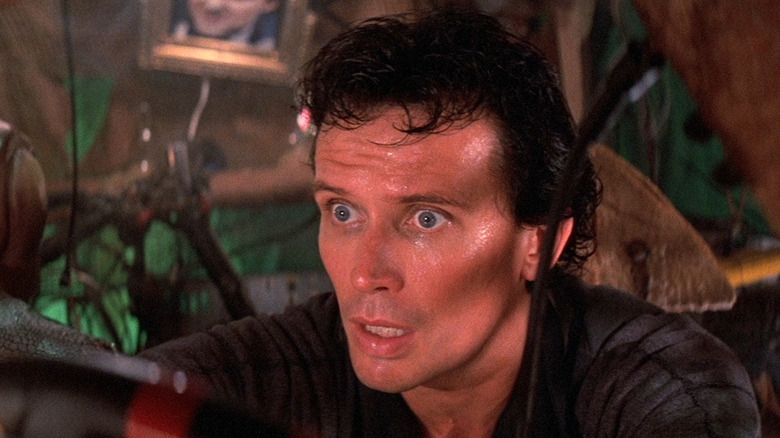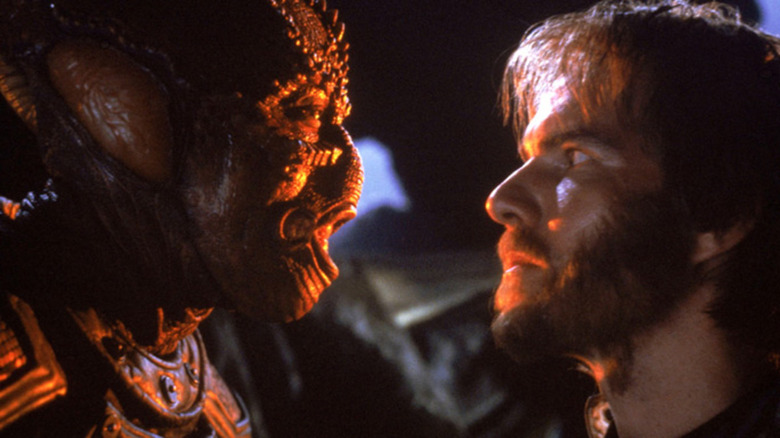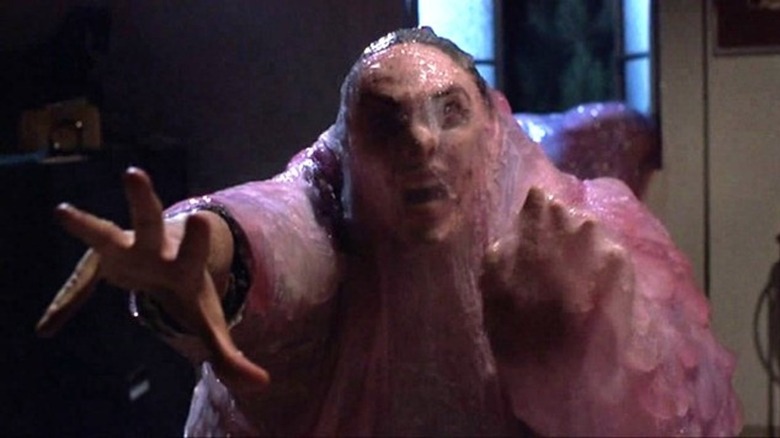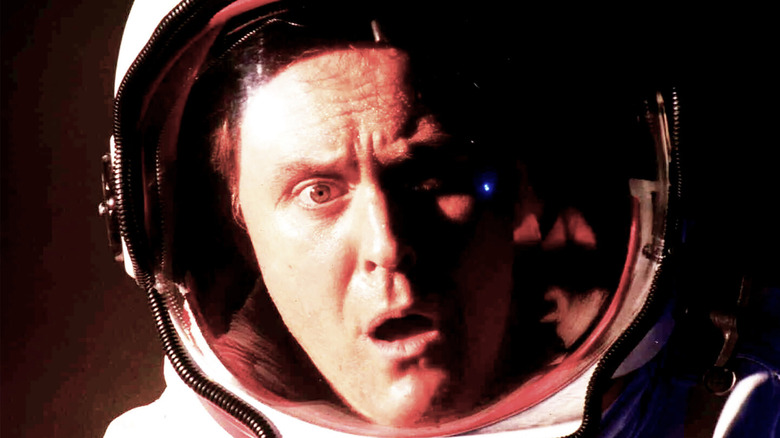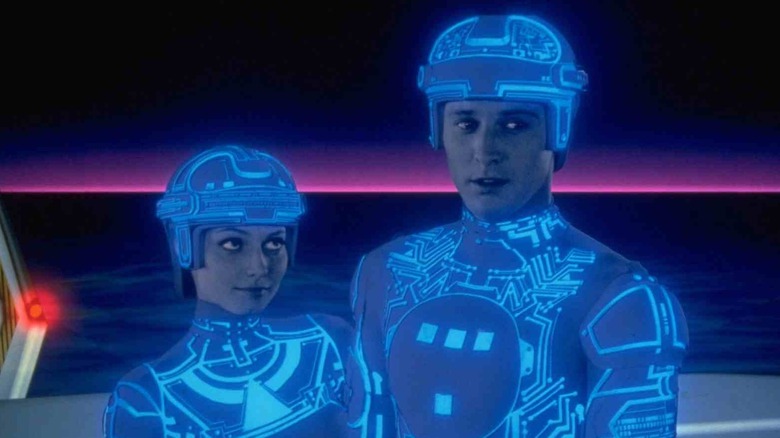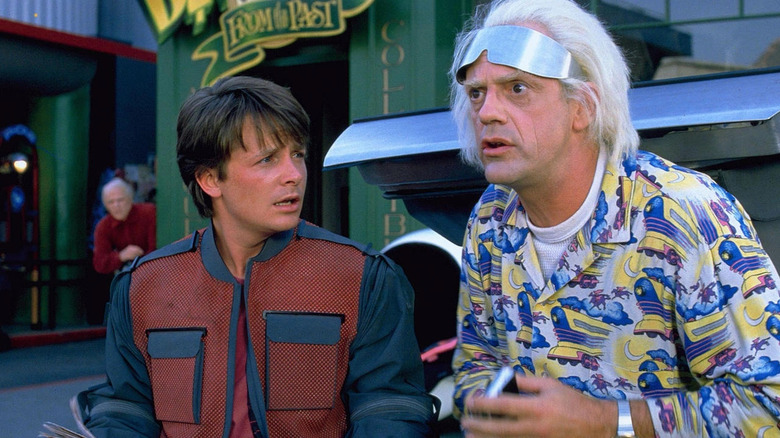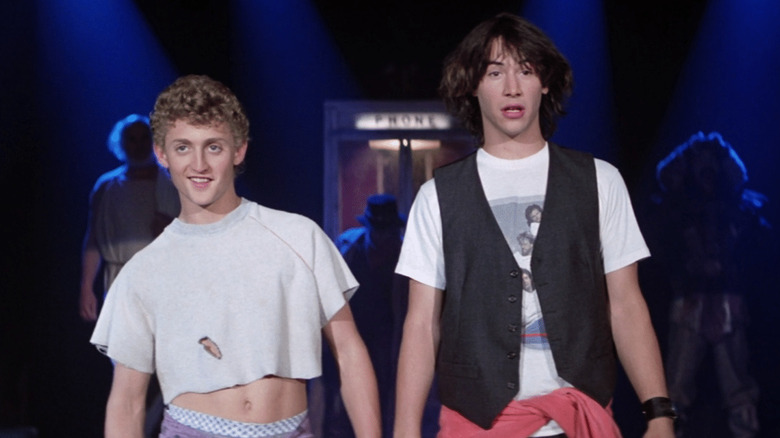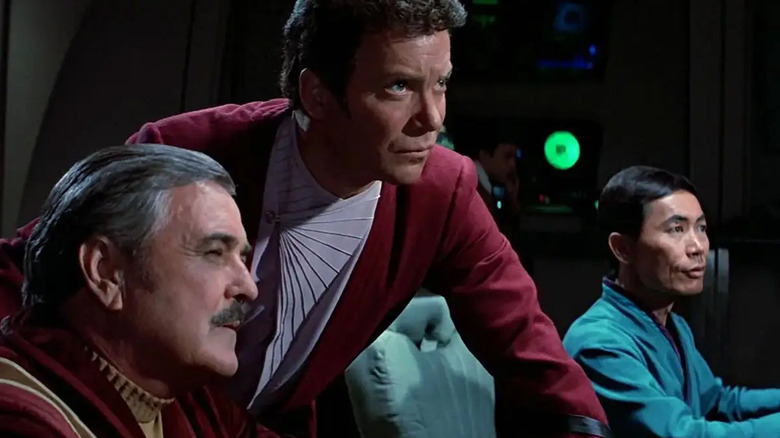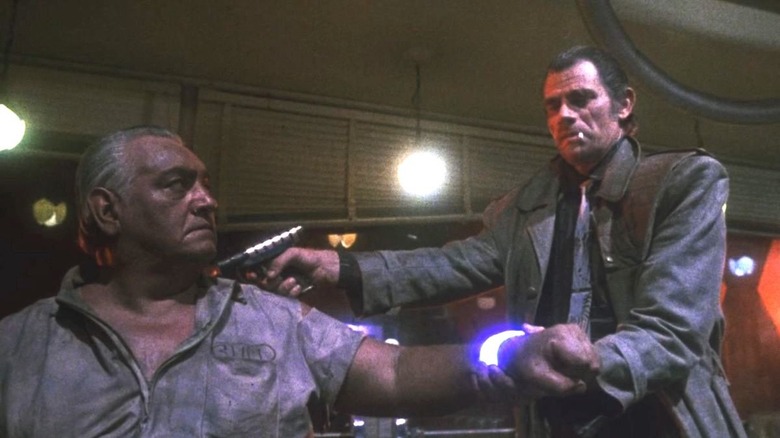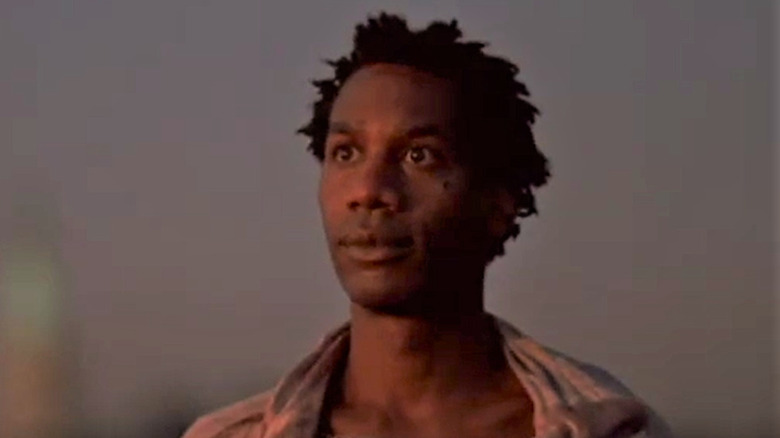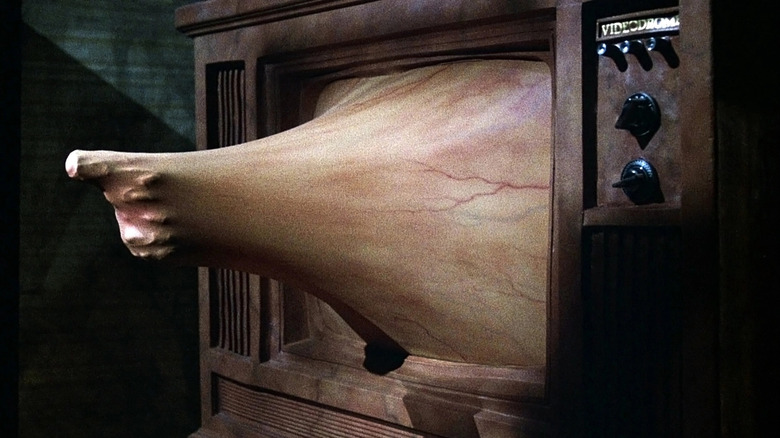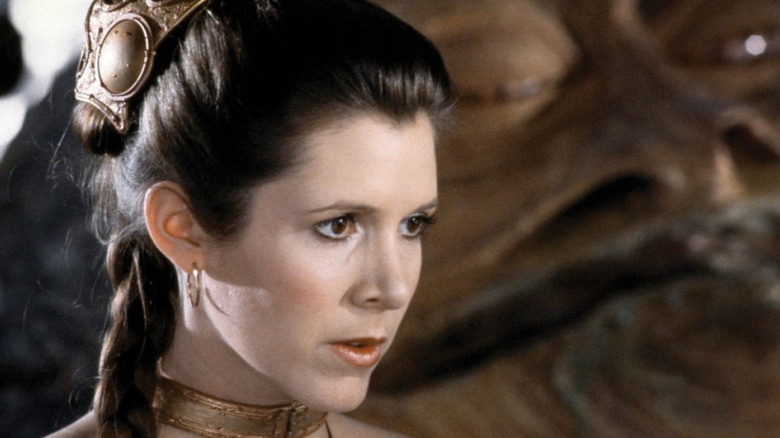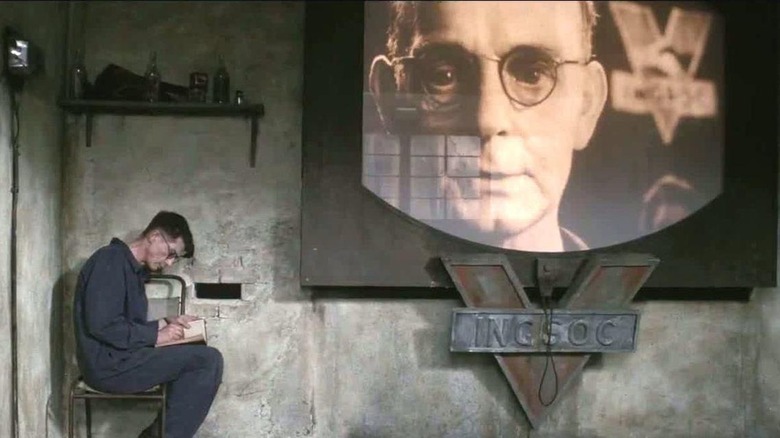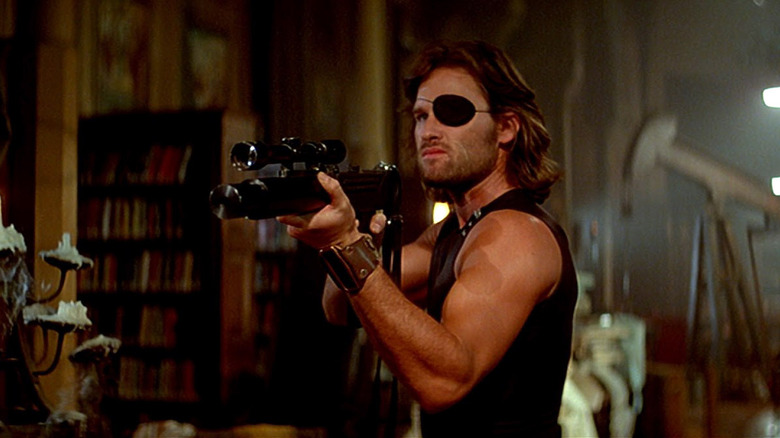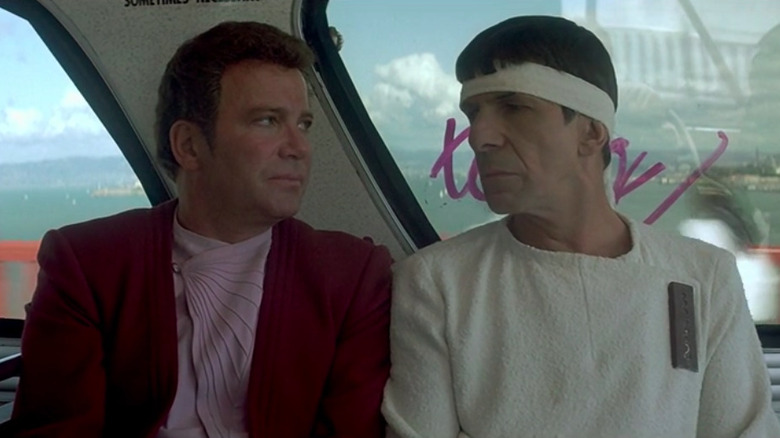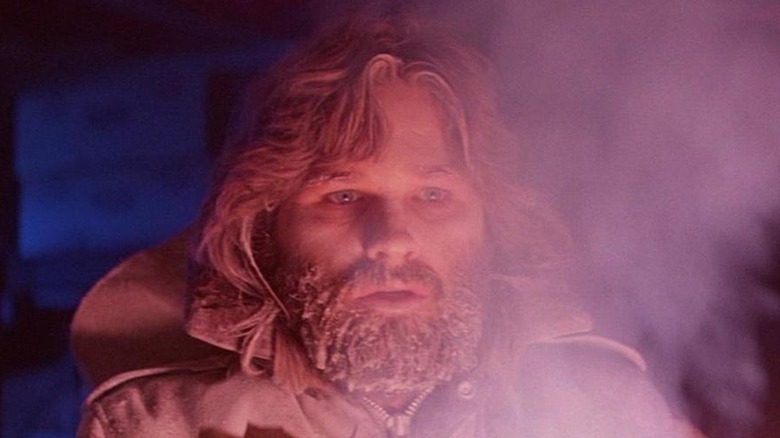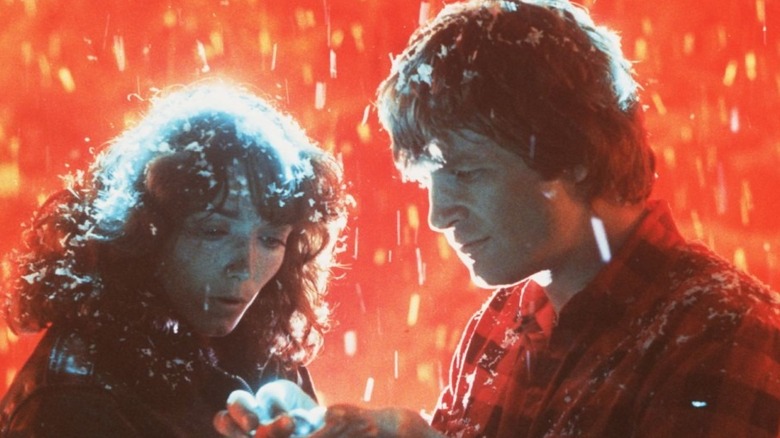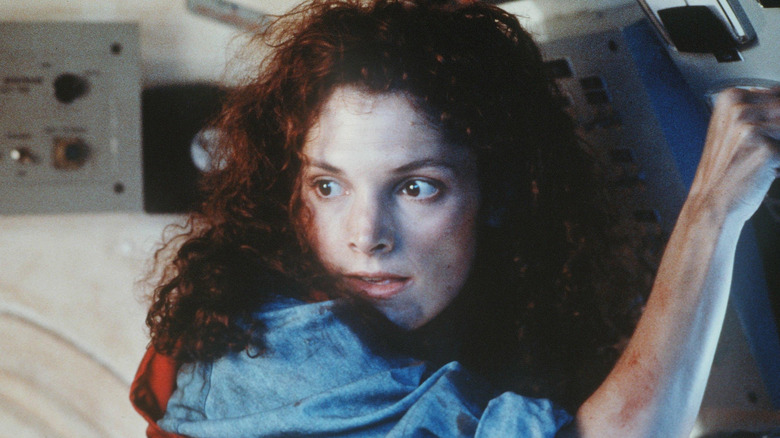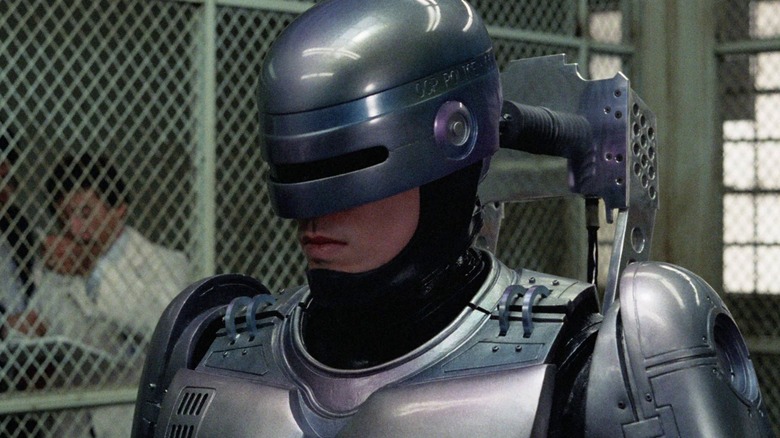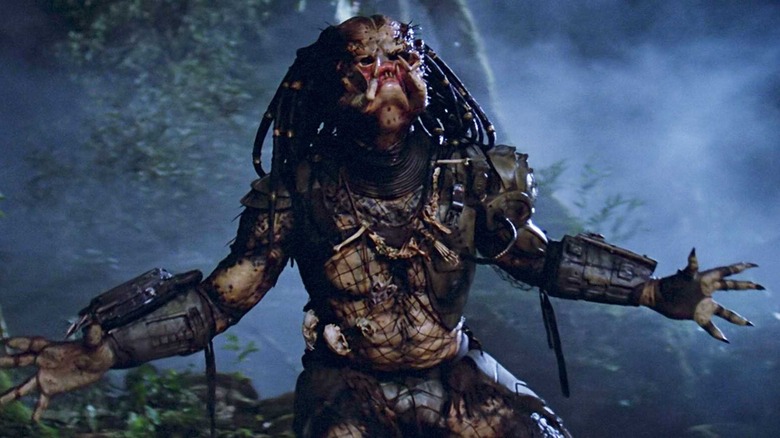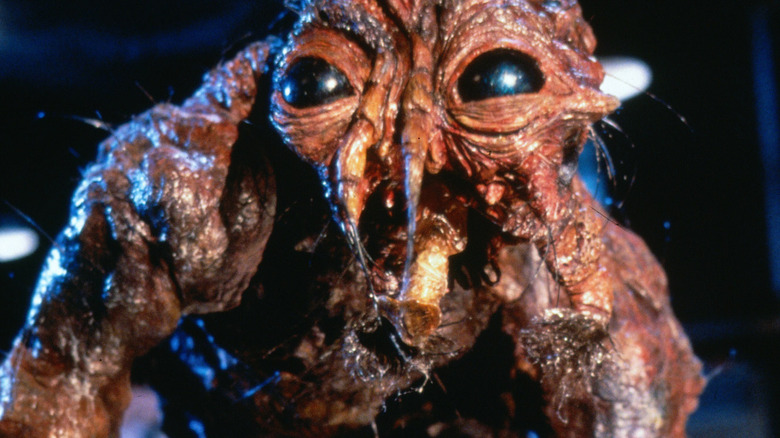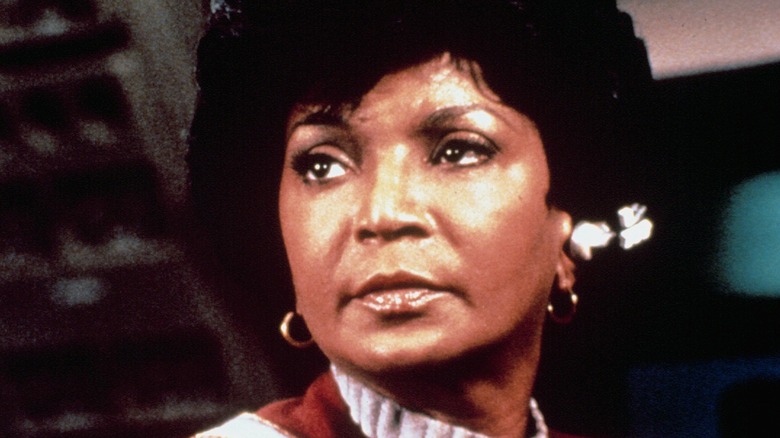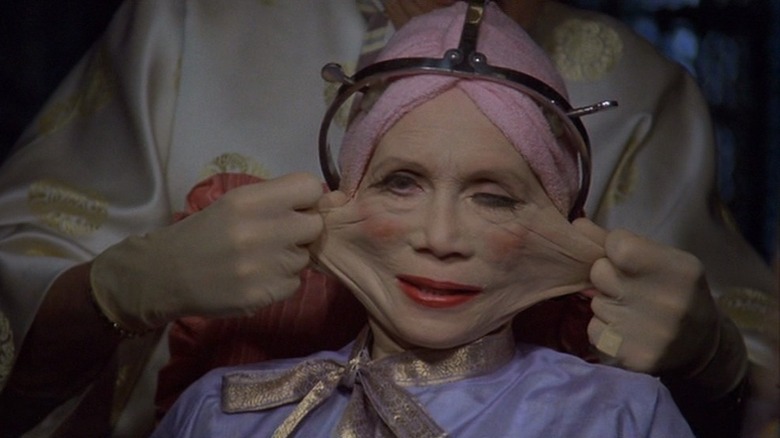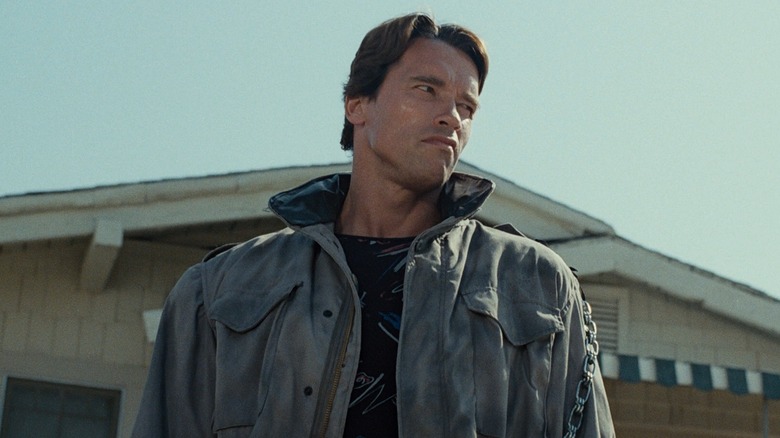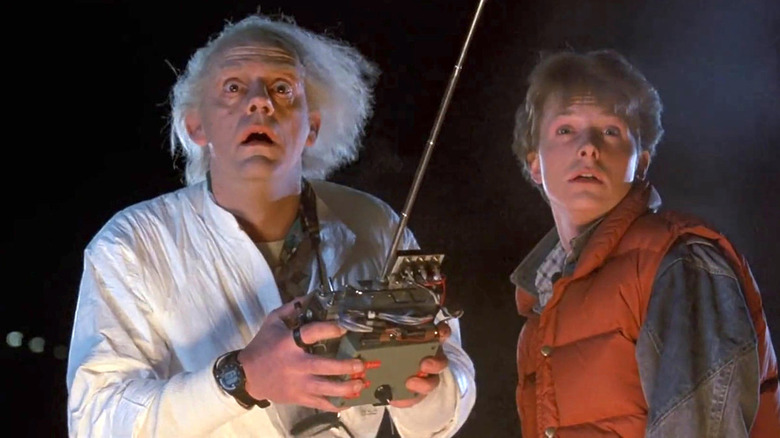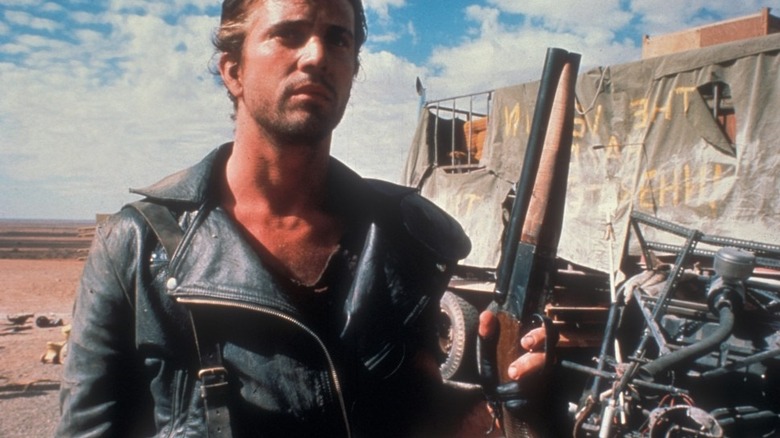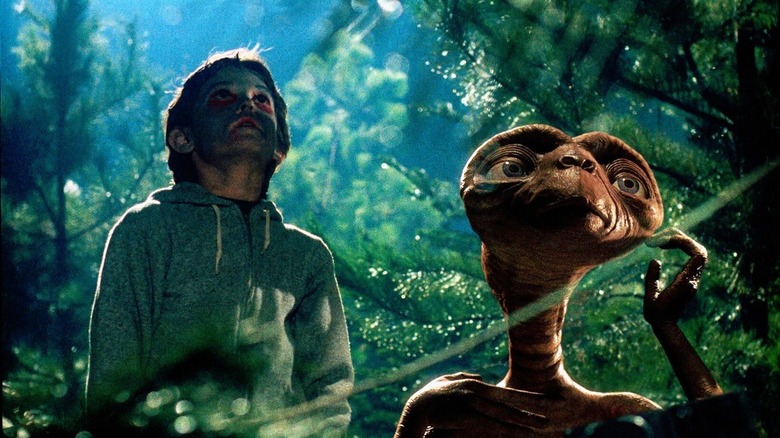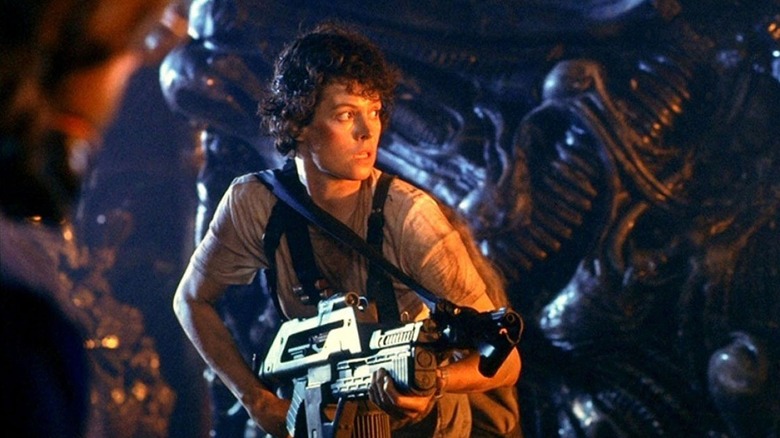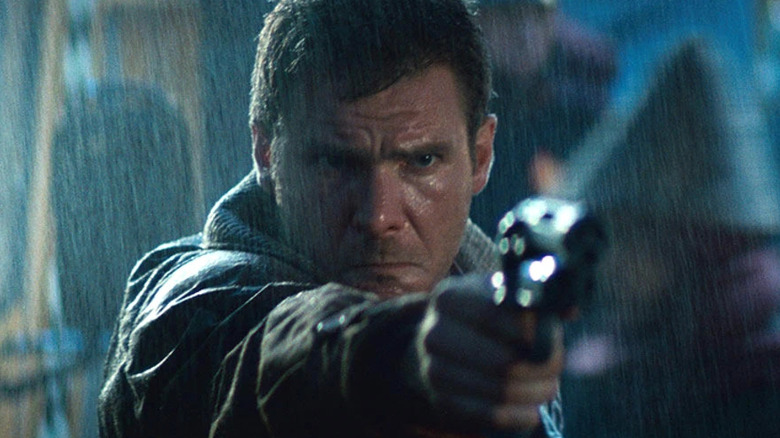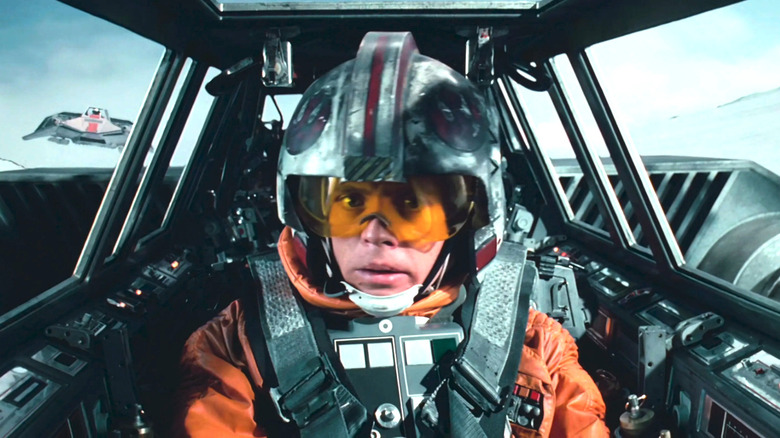The 30 Best Science Fiction Movies Of The '80s Ranked
Science fiction has had many iterations on film, but following a handful of movies that revolutionized the special effects industry, the genre underwent a reinvention at the dawn of the 1980s (via The New York Times). No longer constrained by the limitations of VFX, it seemed like any idea a filmmaker could dream up could be put forth on screen. This led to a new wave of outer space stories, time travel tales, and alien adventures.
But political and technological revolutions gave rise to dystopian stories of dark post apocalyptic futures and cynical cyber-punk cities, a reflection of real world fears of issues like nuclear war, diminishing privacy in a Cold War climate, and the changing boundaries between humans and technology (via Digital Trends). The explosion of these visually extravagant spectacles brought audiences to cinemas in huge numbers, and studios raced to keep up with increasingly more exciting sci-fi movies by capitalizing on a trend that began in the '70s: the blockbuster. The '80s were focused on the franchise, with multi-film sagas like "Star Wars," "Alien," and "Mad Max" releasing the next chapters in their popular stories.
Producing some of the most iconic sci-fi films ever made, the '80s are considered by many to be the golden age of the genre on the big screen. Directors like John Carpenter and James Cameron came to prominence, and Hollywood's most famous aliens were born then too. But which are the finest of the decade? Strap in, charge the ion cannons, and prepare for hyperdrive, because we've ranked the 30 best science fiction movies of the 1980s.
30. The Adventures of Buckaroo Banzai Across the 8th Dimension
Peter Weller would become better known to audiences for another '80s sci-fi film that shows up much closer to the top of this list, but a few years before he played a cyborg lawman, he was a time traveling adventurer from suburban New Jersey. In "The Adventures of Buckaroo Banzai Across the 8th Dimension," he plays the eponymous hero, leader of a superhero rock band in a story that lives up to the wackiness of its title.
Buckaroo Banzai is a renaissance man: a brilliant scientist, a skilled brain surgeon, a maverick test pilot, and yes, a rock star too. But thanks to his mentor, Dr. Tohichi Hikita (Robert Into), he's about to become a crime-fighting, dimension-jumping hero. Hikita has built a device that allows his souped-up Ford F350 to jaunt into other dimensions, but on his first joyride, he gets the attention of a psychotic madman, who plots to take over the Garden State with an army from the 8th dimension. With the help of his band — the Hong Kong Cavaliers — it's up to Banzai to stop the evil invaders and save New Jersey.
Perhaps released in the wrong era, "The Adventures of Buckaroo Banzai Across the 8th Dimension" never did find much success. However, it was given good reviews for its tongue-in-cheek tone, wild sci-fi adventure, and strong cast. In addition to Weller, the roster of stars includes Jeff Goldblum, John Lithgow, Carl Lumbly, Clancy Brown, Christopher Lloyd, and Ellen Barkin.
29. Enemy Mine
If you can put aside your thirst for high quality special effects and elaborate big budget action, you'll be impressed with the underrated "Enemy Mine." The 1985 sci-fi flick directed by Wolfgang Peterson ("Das Boot") and starring Dennis Quaid and Louis Gossett Jr. looks beyond the spectacle and visual splendor that drew audiences to the likes of "Star Wars" and "Tron." Instead, it focuses on a small, intimate character story in outer space.
"Enemy Mine" is a movie with a message about tolerance, racism, and acceptance, told through the story of future space pilot Will Davidge (Quaid), who holds an intense prejudice against Earth's greatest enemy, the Dracs. The supposedly devious, reptilian alien race is locked in a deadly war with mankind, but when Davidge and a Drac fighter named Jeriba (Gossett Jr.) both crash land on an inhospitable planet in the midst of battle, they're forced to overcome their differences and work together to survive.
An important story that teaches us that we have more in common with our enemies than we have differences, "Enemy Mine" uses science fiction the way it was intended: to teach its audience a lesson of understanding. Though decently reviewed, this is one sci-fi movie has lived in relative obscurity for decades, but is still one of the '80s' best.
28. The Blob
The 1980s saw a rash of remakes of classic b-movies, not the least of which was "The Blob," which writer Frank Darabont adapted from the 1958 sci-fi monster movie starring Steve McQueen. While the original had been hampered by a low budget and FX limitations, the 1988 remake had no such hinderances. This helped the filmmakers craft one of the more shocking, visceral, and heart-stoppingly horrifying science fiction monster movies of the decade.
In the small town of Arborville, California, a meteor strike releases what appears to be an alien organism that feeds on human flesh. A group of local teens discover the alien and quickly sound the alarm. But before they can convince authorities of the threat, it finds a home in the sewer system, periodically oozing onto the streets to feast on the townsfolk. The teens meet Dr. Meadows (Joe Seneca), who seems to be know more about the threat than he lets on, and they begin to wonder about the true nature of the deadly creature.
Instead of a charming b-movie romp about a dangerous threat from the stars, the 1988 remake of "The Blob" takes a fast-paced sci-fi thriller approach about fear and paranoia, which resonated with critics. Genuine scares and nauseating horrors are the order of the day, and the film delivers them in spades.
27. 2010: The Year We Make Contact
When it comes to famous sci-fi sequels, "2010: The Year We Make Contact" often gets overlooked. No matter how good it is, it can't help but pale in comparison to its predecessor, Stanley Kubrick's 1968 classic "2001: A Space Odyssey." This 1984 follow-up, based on the sequel novel by series creator Arthur C. Clarke, is very different from the first film. It is a more plot-driven, less esoteric story of an exploratory mission to investigate the disappearance of David Bowman and his crew.
Nine years have passed since the events of "2001" that saw a mission to Jupiter go disastrously wrong, with an entire crew going missing under mysterious circumstances. Both the U.S. and Soviet Union are preparing space-bound missions to find out what went wrong. The Russians will be ready first, but they need American engineers to get aboard Discovery One, so they decide to work together. While they discover hidden truths in the far reaches of space however, turmoil on Earth threatens to derail their mission.
It was impossible to be as revolutionary as "2001," so this sequel was largely seen as standard sci-fi fare. But on its own merits, the film is a compelling space thriller with a dash of political intrigue, good performances, solid direction, and many critics agreed that it is ultimately a strong and faithful adaptation of Clarke's novel.
26. Tron
A groundbreaking film that was much more about its stunning visuals than its simple story, the 1982 Disney movie "Tron" explored the then-alien world of computers and programming. At a time when such technology hadn't yet invaded our homes, these futuristic machines still felt relatively fantastical, making the world of computers ripe for an imaginative story. Starring Jeff Bridges, Bruce Boxleitner, and David Warner, the film took the futuristic adventure of "Star Wars" and brought it into a magical digital realm.
Kevin Flynn (Bridges) is a computer programmer, who has developed a video game where characters do battle in an other-worldly realm called The Grid. But when he gets wind that powerful executive Ed Dillinger (Warner) is planning to steal his work, he fights back, but is inadvertently pulled into the digital world of his own game. There, he joins with Tron (Boxleitner), a powerful warrior leading a revolt against the tyranny of the Master Control Program, who looks suspiciously like Dillinger. Flynn soon discovers that his friends, colleagues, and enemies in the real world all have counterparts on The Grid, and now he must fight to protect his program.
Dazzling audiences with revolutionary spectacle, "Tron" may have been a movie that was too far ahead of its time. Though never a big hit in theaters, it went on to become a cult classic that has kept audience's rapt attention for decades. This continued interest led to a long-awaited sequel, "Tron: Legacy" in 2010, with a third in the works starring Jared Leto.
25. Back to the Future Part II
1986 was the year that TV actor Michael J. Fox turned into a big-screen superstar, thanks to his summer hit of "Back to the Future." At the conclusion of the time-warping story, Doc Brown (Christopher Lloyd) returns to the home of hero Marty McFly (Fox) in search of his help for a new trip through time. This time, he claims that Marty's children are in peril ... all the way in the year 2015. Audiences were left with a tantalizing "To Be Continued," and in 1989, fans finally got the sequel of "Back to the Future Part II."
Zipping off to 2015, Marty and Doc Brown hope to prevent the McFly kids from ruining their lives. But when their mission goes wrong, and an elderly Biff Tannen (Tom Wilson) steals the DeLorean for a trip into the past, Doc and Marty return to find 1985 a dark and dystopian alternate reality. To fix the present and the future, they'll have to go back to 1955 once more. There, they discover that a younger Biff is using knowledge of the future to become rich and powerful, altering the course of history.
Though it doesn't quite match the pioneering first film, "Back to the Future" does embrace its sci-fi weirdness with more mind-bending time travel hijinks. A roller coaster ride through time, the sequel has delighted audiences and ends on an even more dramatic cliffhanger that left original fans hungry for its 1990 follow-up.
24. Bill & Ted's Excellent Adventure
Following in the footsteps of "Back to the Future," the time travel comedy "Bill & Ted's Excellent Adventure" follows a pair of California high schoolers, who are whisked off for an adventure through time. In this one though, their companion is the wry, sarcastic comedian George Carlin, who plays Rufus, a wise, sagely historian from the far future where the two boys have become cultural icons for their fabled heavy metal music.
Alex Winter and Keanu Reeves play the pair of dim-witted teens, Bill S. Preston and Ted "Theodore" Logan, whose fruitless attempts at writing music in their two-man band The Wyld Stallyns is nothing less than laughable. But when they're facing a failing grade in their history class, the two boys get a visit from Rufus. He's here to help them complete the assignment because if they fail, they'll never write the music that changes the world for the better. Rufus takes them back in time to visit the likes of Genghis Khan, Napoleon, and Socrates to learn about history firsthand, and in the process, he gives them the adventure of their lives.
A raucously wild comedy, the film was a surprise hit at the box office and with critics. It turned Reeves into a star, and earned itself a 1991 sequel ("Bill & Ted's Bogus Journey"), a pair of TV spin-offs, and a three-quel more than 30 years later with 2020's "Bill & Ted Face the Music."
23. Star Trek III: The Search for Spock
Following the success of 1982's "Star Trek II: The Wrath of Khan," the franchise turned the 1984 follow up "Star Trek III: The Search for Spock" essentially into a part two of its predecessor. Although "The Search for Spock" didn't match the critical acclaim of "The Wrath of Khan," it is still a first-rate sci-fi movie, which embraces action a bit more than other films in the series.
"The Search for Spock" picks up where "The Wrath of Khan" left off: Spock (Leonard Nimroy) is dead, but Kirk (William Shatner) and crew barely have time to mourn, as the Enterprise is decommissioned and they are all re-assigned. But when Dr. McCoy (DeForest Kelley) begins acting strangely, Spock's father Sarek reveals that his son may have spirited away his own soul into his comrade's body. So, Kirk must disobey orders, steal the Enterprise from spacedock, and get McCoy back to the Genesis planet and reunite Spock's body with the soul trapped within the bitter doctor. But when he gets there, a devious Klingon named Kruge kidnaps Kirk's son David in a quest to control the power of Genesis.
A thrilling sci-fi joyride, "The Search For Spock" may have been overshadowed by the two better films that sandwiched it, but in some ways it may be the one film in the series that best captures the spirit of the classic TV show on the big screen.
22. Trancers
A detective noir story that will remind you of a few other films — like "Blade Runner" and "The Terminator" — the 1984 low budget sci-fi action movie "Trancers" has lived in the shadow of these bigger classics for decades. Nevertheless, the film is an excellent one that's more than worthy of a list of the decade's best, even if you may never have heard of it.
The film starts out in the far future of the 23rd century where Detective Jack Deth (Tim Thomerson) has been leading a manhunt for notorious criminal mastermind Martin Whistler (Michael Stefani). A psychic madman, Whistler can turn ordinary, unsuspecting victims into blood-thirsty psycho-killers called "trancers." But just as Deth closes in, Whistler escapes into the past through an injectable serum that allows his consciousness to travel through time and inhabit the body of an ancestor. When Deth pursues him in the same manner, he finds himself in the 1980s in the body of journalist Phil Dethton, whose girlfriend Leena (Helen Hunt) helps him track down the deranged Whistler — whose ancestor in this era is a Los Angeles cop.
Though it draws heavily from the works of Ridley Scott and James Cameron as well as film noir of the 1940s and '50s, critics agreed that "Trancers" blends these elements together into something special.
21. The Brother From Another Planet
While wider audiences may know Joe Morton more for his role as Miles Dyson in 1991's "Terminator 2: Judgment Day," he gave a more powerful but more overlooked performance in the 1984 low budget sci-fi drama "The Brother From Another Planet." Written and directed by John Sayles, this film brings an alien from outer space down to Earth in a unique take on a time-tested sci-fi parable.
Morton is the titular "Brother," a being from another planet who resembles an ordinary African American, save for his three-toed feet. Though he cannot speak, he can read minds. But when he arrives, he is absolutely flummoxed by the world he encounters and the people in it. After using his fantastical alien abilities to fix mechanical objects with just a touch, he secures himself a job as a repair man and begins to build a life for himself on Earth. When a pair of men in black come in pursuit of him, he slowly begins to learn about humanity and appreciate its uniqueness ... flaws and all.
A thematically weighty but often times funny sci-fi story, "The Brother From Another Planet" is an introspective look at the modern world through the eyes of a curious outsider that has found a new life with critics and audiences alike.
20. Videodrome
The '80s were a decade for science fiction to push boundaries, with movies that offered up stories and visuals unlike anything audiences had seen — or were ready for. One such movie that stunned viewers with a horrifying new vision was director David Cronenberg's 1983 feature "Videodrome," a spiritual follow-up to his lesser-seen 1981 cult classic "Scanners." This time, the director had major studio backing, a bigger budget, and a wider theatrical release, and the result was an even better sci-fi body horror classic.
A dystopian story set in a dark future world where violence is the purest form of entertainment, TV executive Max Renn (James Woods) has been given orders to improve his station's ratings. Introduced to a new program called "Videodrome," Max is fascinated by the over-the-top violence of a show that's entirely devoid of story, which focuses on victims subjected to the most gruesome punishments imaginable. Captivated by its salaciousness, he begins airing it immediately, but when his girlfriend Nicki (Debbie Harry) auditions for the show and disappears, he realizes "Videodrome" may be more than a simple TV show.
A truly shocking, borderline adult film, "Videodrome" is an uncomfortable watch that is downright surreal at times. But even uneasy critics had to praise the film for its a haunting and unforgettable portrayal of a bleak future where technology and imagination have gone terribly wrong.
19. Return of the Jedi
With stunning revelations in 1980's "The Empire Strikes Back" and a cliffhanger ending that left the life of Han Solo hanging in the balance, anticipation for the final film in the "Star Wars" trilogy was at a fever pitch when it landed in theaters in 1983. Though it was difficult to live up to the greatness of its predecessors, "Return of the Jedi" nonetheless gave audiences everything they could have hoped for, resolving all of the storylines with rousing sci-fi spectacle and even a few plot twists that set the stage for decades' more stories on big and small screens.
With Darth Vader now determined to turn his son to the dark side, the film opens with Luke's daring rescue of Han Solo on Tattooine. After the rebels learn that the Empire has constructed a second Death Star, they set out to destroy it before it is fully operational, gathering at the forest moon of Endor. Luke infiltrates the Imperial stronghold in an attempt to save his father from the Emperor's evil influence, but if he's not careful, he could endanger the entire rebel plan.
With jaw-dropping space battles, tense fire-fights, and a climactic confrontation with the Emperor himself, "Return of the Jedi" dazzled audiences and critics and capped off one of the greatest movie trilogies ever made.
18. 1984
Based on a book with a dark, dystopian premise, the big screen adaptation of George Orwell's "1984" landed in that same titular year, and proved the perfect movie for the era. A British production starring John Hurt and seven-time Academy Award nominee Richard Burton in his final feature film, it does justice to its literary source material while offering a frightening portent of things to come in the real world at the same time.
Like the book, the film centers on Winston Smith (Hurt), an otherwise anonymous pencil pusher for a totalitarian government in the mega-state of Oceana in an alternate 1984. This bizarre world is run by Big Brother, a powerful overlord whose reach extends to every facet of modern life. The Thought Police watch people's every move and the Ministry of Truth — for which Smith works — controls the narrative flow of information to the people. However, Smith defies the rules of the regime by writing his own independent thoughts in a journal, which he hides away from prying eyes. His dreary life is turned upside down when he meets open dissenter Julia (Suzanna Hamilton), a woman who ignites a fire in his soul.
Bold and unrelenting in its warnings about a future that we may very well be headed to, "1984" is still one of the best screen adaptations of one of Orwell's works.
17. Escape From New York
The 1980s were awash in low budget science fiction action movies, but few rose above the rest the way that John Carpenter's 1981 classic "Escape from New York" did. Following a pair of iconic horror films — "Halloween" and "The Fog" — the director moved to dystopian sci-fi in his first of four collaborations with star Kurt Russell, who was at that point just a few years removed from starring in all-ages Disney movies like "The Strongest Man in the World." Here, Russell is gifted what is arguably his most famous role, that of futuristic outlaw Snake Plissken.
In a violent, crime-ridden future, the entire city of New York has been walled off and turned into a massive island prison, where ex-soldier Plissken has been sent to serve a sentence for attempting to rob the Federal Reserve. But when Air Force One is hijacked and crashed into Manhattan, Plissken is given an offer to save the President of the United States to win his freedom.
Like many sci-fi movies of the '80s, "Escape From New York" wasn't a barn burner at the box office, but it became a cult hit soon after, loved by critics and audiences alike. It also turned the former Disney actor into a major action star. Though it's not the best film in Russell's catalog, it did add Plissken to the pantheon of great '80s heroes.
16. Star Trek IV: The Voyage Home
Time travel stories have been a time-honored tradition in science fiction since its inception, so it's not surprising that several of the top films of the 1980s involved a jaunt back in time. "Star Trek IV: The Voyage Home" — the fourth film in the "Star Trek" series — was one of them. It concludes the three-film saga that began with "Star Trek II: The Wrath of Khan," and sees Kirk and crew traveling back from the 23rd century to our "present day" of 1986. With a more light-hearted tone that Trekkies might not be have expected, the film had a wider appeal and became one of the biggest hits of the year.
After the destruction of the Enterprise at the end of "Star Trek III: The Search for Spock," Kirk and his crew take a newly revived Mr. Spock aboard a stolen Klingon Bird of Prey back to Earth to face punishment for violating orders. But when they arrive, they find Earth in peril from an alien probe that is bombarding the planet with dangerous energy waves in an apparent attempt to communicate with the world's whales that have been extinct for centuries. To save the planet, Kirk travels back in time to 1986 to find two humpback whales that can respond to the probe.
A mix of sci-fi adventure, madcap hijinks, and a fish-out-of-water story helped the film ride up the box office, becoming the highest-grossing "Star Trek" film at the time, and one of the franchise's most beloved entries.
15. The Thing
Already an iconic horror director thanks to his seminal slasher "Halloween" in 1978, filmmaker John Carpenter and star Kurt Russell re-teamed just a year after "Escape from New York" for the sci-fi horror movie "The Thing." A remake of the 1950s classic "The Thing from Another World," the pair turned an old b-movie into one of the creepiest and most terrifying science fiction films of the decade.
In the remote reaches of the unexplored Antarctic sits a scientific research station where a strange creature has been unearthed from the ice. Isolated from civilization, the team stationed there are forced to contend with a horrific, shape-shifting monster from the stars that seems to only have one goal: to kill every last one of them. But how can they stop a vicious alien killer when it can change shape and be disguised as any one of them?
Brutal and uncompromising in its ferocity, graphic violence, and chilling suspense — helped by an eerie score by spaghetti Western icon Ennio Morricone — "The Thing" was initially dismissed by critics and audiences (via The New York Times), but it has since become a bonafide classic that has only gotten better as time has passed. Thought of today as one of the best remakes of all time, "The Thing" helped reinvent multiple genres, influencing a number monster movies, science fiction films, and horror slashers in its wake.
14. Starman
A string of successful horror movies and science fiction thrillers like "Halloween" and "Escape from New York" gave director John Carpenter a certain reputation in Hollywood. Looking to prove himself with more diverse work, the director signed up to helm "Starman," a sci-fi romantic drama that the Chicago Tribune called "'E.T.' for grown-ups." With a big budget and special effects from George Lucas' ILM, the film was far from the low budget films Carpenter was used to, but helped him show off just what a solid filmmaker he was.
An alien being made of pure light and energy arrives on Earth. After coming across the Voyager 2 space probe, he found directions to Earth and came to our planet hoping to make contact with humanity. But his spacecraft is struck down by the military, which leaves him stranded. An encounter with a recently widowed young woman (Karen Allen) deeply affects the being, and when he takes the form of her dead husband Scott (Jeff Bridges), he learns about humanity — and falls in love — while waiting for his own kind to rescue him.
A moving story of love and loss, "Starman" uses science fiction to tell an awe-inspiring star-crossed romance that's both tragic and uplifting. Though not the blockbuster the studio hoped, it earned Bridges an Oscar nomination for best actor, and received a short-lived TV spin-off as well.
13. The Abyss
Director James Cameron wasn't a man to pump out films year after year, as he preferred quality over quantity. In the five-year gap between "Aliens" in 1986 and his groundbreaking "Terminator" sequel in 1991, Cameron shot only one feature film. 1989's "The Abyss" centered on one of his biggest personal passions: undersea exploration. But this is no ordinary adventure beneath the waves; it's a sci-fi thriller, which features his frequent collaborator Michael Biehn starring alongside Mary Elizabeth Mastrantonio and Ed Harris.
"The Abyss" sees a team of scientific researchers enlisted by the U.S. government to accompany a team of SEAL commandos on a mission to recover a lost nuclear submarine. Dr. Lindsey Brigman (Mastrantonio) and Virgil Brigman (Harris) are a divorced couple who still work together professionally, despite their strained relationship. But their mission is complicated when they reach the ocean depths and discover a strange alien intelligence down in the deep, and it's unlike anything they could have ever imagined.
A stunning thriller with less focus on big action and more on nail-biting suspense, it's led by Cameron's impeccable direction and penchant for engrossing drama, propped up by some stellar performances from its top-notch cast, which has made it a hit with critics and audiences.
12. RoboCop
Between "Escape from New York," "Road Warrior," and "Blade Runner," the 1980s was the decade that brought dystopian action to the fore. One of the best was 1987's "RoboCop," set in a near future where politics and consumerism have become inexorably intertwined. But like any good science fiction, "RoboCop" uses its futuristic setting as social commentary. In this case, it's a razor sharp political satire that's anything but subtle.
The year is 2043, and mega corporation Omni Consumer Products all but owns the city of Detroit. OCP comes into control of the beleaguered police department, which is besieged by rising crime levels. With a plan to develop cyborg police officers, OCP finds their first test subject when local cop Alex Murphy (Peter Weller) is mortally wounded in the line of duty, and they rebuild him as RoboCop. Though RoboCop is supposed to have no memory of his former life, the old Murphy slowly emerges and RoboCop begins to remember who he once was. When he tries to take down the city's biggest drug kingpin, he stumbles upon a massive conspiracy that puts him at odds with OCP's second generation of robot crime fighter, the ED-209.
Shockingly graphic as only the '80s could deliver, "RoboCop" was a box office and critical hit with a new generation that craved more violent heroes. It was followed by two sequels, several TV spin-offs in both animation and live action, and has gone on to become one of the most popular sci-fi action franchises of the decade.
11. Predator
The '80s were jam-packed with celebrated science fiction action movies and increasingly over-the-top sci-fi action. In the wake of films like "Terminator," "Aliens," and "RoboCop," director Joe McTiernan and star Arnold Schwarzenegger upped the action ante with the 1987 classic "Predator," alongside heavyweights Jesse Ventura, Carl Weathers, and Bill Duke.
Leading a squad of mercenaries into a Central American jungle on a rescue mission for the U.S. government, the cigar-chomping Dutch (Schwarzenegger) gets more than he bargained for when his team becomes the target of a monstrous hunter from space. Ruthless and bloodthirsty, with no apparent motive other than the thrill of the hunt, the alien beast stalks Dutch and his men through the jungle, picking them off one by one. Faced with a seemingly unstoppable force that emerges like a ghost from the darkness, Dutch will have to use every trick up his sleeve to outsmart and outmaneuver the creature if he's to get out alive.
An instant classic, the alien from "Predator" became one of the great Hollywood movie monsters overnight, and it's still ranked among the best action movies of the decade too (via IGN). But while the film remains one of the finest in Arnold's career, it still isn't his best sci-fi movie of the '80s (more on that later).
10. The Fly
With his penchant for visceral body horror in movies like "Scanners" and "Videodrome," director David Cronenberg was the perfect choice to helm the remake of the 1953 b-movie "The Fly." Following the success of "The Thing," it was next '50s classic to be revived in the 1980s. Starring Jeff Goldblum and Geena Davis, "The Fly" has an equally talented cast to pair with Cronenberg's genre-breaking filmmaking skills. This science fiction horror adaptation twists the original film's story from a low-budget chiller into a gory, grizzly, horrifying nightmare.
Seth Brundle (Goldblum) is a research scientist, who has made a startling breakthrough in teleporting technology. While testing his teleportation chamber though, Brundle is unwittingly joined by an ordinary house fly. Though the test appears to be successful, he begins exhibiting strange side effects: increased strength, stamina, agility, as well as a curious craving for sugar. Eventually, Brundle's body itself begins to deteriorate, losing skin, eyes, teeth and fingers, as he slowly mutates into a malformed monstrosity that is neither human nor fly, but something terrifyingly in-between.
One of the most unsettling science fiction films of the decade, the film made Goldblum a star and Cronenberg one of Hollywood's best new directors, as both critics and audiences responded to his disturbing yet poignant vision. Though Cronenberg didn't return for the lackluster 1989 follow up "The Fly II," he did come back to direct a French stage opera version of the film in 2008.
9. Star Trek II: The Wrath of Khan
Debuting on the big screen in 1979, the first "Star Trek" feature film wasn't met with the best reviews, with The New York Times noting "the dialogue ... is of a banality that soothes the weary mind." Luckily, writer and director Nicolas Meyer stepped aboard the franchise for a sequel, and delivered the goods at warp speed by turning out what most fans (and critics) agree is the best "Star Trek" film ever made: 1982's "Star Trek II: The Wrath of Khan." In the era of plainly numbered sequels, the film set a new standard for follow-ups, with a diabolical baddie, big stakes, stunning suspense, and life and death consequences.
James Kirk (William Shatner) is back in the captain's chair of the USS Enterprise along with his intrepid crew when he gets word from an old flame — Federation scientist Carol Marcus (Bibi Besch) — that space station Regula One has come under attack. Marcus has been working on a revolutionary terraforming technology called the Genesis Device, but in the wrong hands, it could become a weapon. When Kirk arrives, however, he is confronted with a ghost from the Enterprise's past: the villain Khan Noonien-Singh (Ricardo Montalban), an imprisoned tyrant he'd defeated once before, but who has escaped and is out for revenge.
At its heart, "The Wrath of Khan" is a thoughtful story of friendship and loyalty. But with hair-raising drama and one of the most shocking third acts in "Star Trek" history, it packs a punch, and still remains one of the most iconic sci-fi movies of the '80s.
8. Brazil
Former Monty Python animator and part-time actor Terry Gilliam directed a handful of feature films through the early '80s, including the fantasy favorite "Time Bandits." But in 1985, Gilliam turned to science fiction for the off-kilter black comedy "Brazil." Set in a futurist dystopia, the film stars Jonathan Pryce, Katherine Helmond, Ian Holm, Robert De Niro, Bob Hoskins, and his former Python mate Michael Palin. Though a major bomb at the box office, it's gone on to become one of the most celebrated genre films of the era.
It all takes place in a dark, dismal future, where we meet a button-pushing bureaucrat named Sam Lowry (Pryce) who has been ground down by the system and dreams of somehow escaping his hum-drum existence. When he becomes captivated by the beauty of an alluring woman who appears like an angel in the middle of his horrific nightmares, he begins to lose his grip on reality. And when he strangely encounters an identical woman in the real world, he becomes obsessed with tracking her down.
A high concept, techno-futurist vision with elements of the absurd and the surreal, "Brazil" may have been a bit too off-beat for audiences on its initial release. Thankfully, time has caught up to "Brazil" with critics and audiences agreeing that it's one of the best that the decade had to offer in any genre.
7. The Terminator
A film that was sparked by a fever dream, "The Terminator" in some ways has more in common with the slew of low-budget b-movies that were churned out in the 1980s like "The New Barbarians" or "Steel Dawn." But the 1984 sci-fi actioner has James Cameron's inventive and efficient script, his slick direction, and of course, the intimidating presence of emerging superstar Arnold Schwarzenegger, all of which help it rise above the ranks.
In a post-apocalyptic future, humanity has been decimated by a race of cyborgs, but rebel humans have begun to turn the tide. To stop them, a T-800 Terminator (Schwarzenegger) — a robot disguised as a human — is sent back in time to 1984 to kill Sarah Connor (Linda Hamilton), the young woman who will one day give birth to mankind's greatest leader, John Conner. So, the resistance sends its own protector back in time: Kyle Reese (Michael Biehn), a veteran of the future war. However, keeping Sarah Conner alive isn't so easy when the world of the past is unprepared for the deadly Terminator, a seemingly unstoppable killing machine.
Action-packed and full of raw emotion, "The Terminator" was a landmark in both sci-fi and action genres and remains universally loved by critics and audiences. While Cameron followed it with a stellar sequel in 1991, four additional films in the series have failed to meet the heights of the original.
6. Back to the Future
A science fiction coming-of-age story, Robert Zemeckis' "Back to the Future" took the '80s by storm and became an all-time classic while jumpstarting a franchise. Originally written with TV star Michael J. Fox in mind, the studio was forced to start production with actor Eric Stoltz instead due to Fox's busy schedule (via Vulture). But when the replacement star wasn't up to snuff, the studio quickly found a way to get their man, who joined wide-eyed Christopher Lloyd to form one of the best on-screen duos ever.
Marty McFly (Fox) is a California teen whose scientist friend "Doc" Emmett Brown has turned a DeLorean into a time machine. But while testing his new invention with Marty in the driver's seat, Brown is shot dead by armed gunmen, and Marty escapes by traveling backwards in time to 1955. There, Marty unwittingly disrupts the romantic courtship of his parents when his own mother becomes smitten with him. While he attempts to reignite the spark between his mother and father, he works with a younger Doc Brown to find a way to get back to the future.
A big hit in theaters, 1985 sci-fi romantic comedy proved to be a delight for everyone, crossing generations to become beloved by fans of all ages. It spawned two sequels and provided both Lloyd and Fox with their most iconic roles.
5. Mad Max 2: The Road Warrior
There's always been some debate as to whether grungy, post-apocalyptic neo-Westerns like "Mad Max" are really science fiction, or if they belong in their own unique category. But when it comes to '80s sci-fi, no list would be complete without them, and the 1981 classic "The Road Warrior" tops the list in this sub-genre. A sequel to the revolutionary 1979 Australian original "Mad Max," it was "The Road Warrior" that many American audiences saw first, and is usually ranked as the better of the two.
Once again set in a world ravaged by nuclear holocaust, gasoline is the world's most precious and valuable resource, and most of civilization has long since crumbled to dust. Max (Mel Gibson) is a renegade warrior who roams the barren landscape fighting off mutants and bandits. A lost soul, Max has little else to lose, but he finds a new cause to fight for when he comes to the aid of a small community under assault from a ruthless gang of deranged bikers led by the masked madman called Humungus.
With a bigger budget and more experience after the 1979 original, writer and director George Miller crafted one of the finest post-apocalypse films ever. An engrossing, exhilarating, post-apocalyptic adventure, "The Road Warrior" was topped only in 2015 when Miller's own legacy sequel "Fury Road" was released.
4. E.T.
In 1982 Director Steven Spielberg was already the preeminent director in Hollywood, thanks to his classics like "Raiders of the Lost Ark," "Jaws," and "Close Encounters of the Third Kind." But he proved he could turn out hits in any genre with "E.T.: The Extraterrestrial," a science fiction favorite and the quintessential family film of the '80s that went on to become the highest-grossing film of the decade (take that, "Star Wars").
The poignant story of a family that adopts a lovable, misunderstood alien from outer space, "E.T." follows siblings Elliott (Henry Thomas), Gertie (Drew Barrymore), and Michael (Robert MacNaughton), who discover the bottle-necked, wide-eyed alien after he becomes stranded on Earth. Hiding him in their home, Elliott develops a strange connection to the creature, who possesses incredible other-worldly healing powers. But while Elliott helps his new friend build a device to help him reach his own kind in outer space, shadowy government agents come looking for them.
A moving tale of friendship, "E.T." tugs at the heartstrings of viewers young and old, and even after a misguided attempt to re-edit and alter the movie, it remains one of the best sci-fi movies — and one of the most beloved films — ever made.
3. Aliens
Following his breakout effort on "The Terminator," James Cameron stepped in to write and direct the more action-heavy sequel to Ridley Scott's 1979 sci-fi horror classic "Alien." Cameron took the first film's creepy suspense-laden horror and turned it into a brutal, fast-paced, run-and-gun action movie with its own unique brand of chills.
After escaping the Nostromo in the first film, Ellen Ripley (Sigourney Weaver) is revived by her superiors at the Weyland-Yutani Corporation after nearly six decades in stasis. Concerned about her story of alien eggs on LV-436, Ellen is assigned to a team of space marines sent back to the moon to investigate. But when they arrive it's already too late: The colony there has been nearly wiped out by the alien menace. Now, Ripley and a team of heavily armed soldiers quickly find themselves stranded, and surrounded by an army of bloodthirsty alien beasts.
Eschewing the eerie horror vibe of the first film, the critically loved "Aliens" is instead filled to the brim with pure adrenaline pumping action. With an eclectic cast that includes Michael Biehn, Lance Henriksen, Bill Paxton, Paul Reiser, and Jenette Goldstein, sci-fi director-of-the-decade James Cameron brings an explosive flare to the franchise that still hasn't been topped.
2. Blade Runner
A landmark science fiction epic that essentially invented a new sub-genre of cyberpunk thrillers, 1982's "Blade Runner" came from the mind of "Alien" director Ridley Scott, and starred Harrison Ford hot off the heels of "Raiders of the Lost Ark." Based on Philip K. Dick's short story "Do Androids Dream of Electric Sheep?," "Blade Runner" is an awe-inspiring visual masterpiece, an immersive future world unlike anything audiences had ever seen before at the time. But it is more than just a feast for the eyes; it is also a daring neo-noir crime thriller and philosophic exploration of self.
Set in a dystopian future, society is ruled by mega corporations and technology has crept into every aspect of our lives, including life-like android human replicants who live among us. Law enforcement agent Rick Deckard (Ford) is saddled with the job of tracking and capturing rogue replicants. His latest assignment is to eliminate Roy Batty (Rutger Hauer), an android who refuses to be deactivated and plans to lead a rebellion of his artificial brethren. But while hunting for Batty, Deckard begins to question the nature of the replicants and what it means to be human.
An ambitious sci-fi crime drama, "Blade Runner" has become a critically acclaimed cult classic for its stunning visual effects, lush world-building, and mind-bending story. Over the years, its greatness has only gotten better, with new extended editions and revamped director's cuts that somehow managed to improve this masterpiece.
1. The Empire Strikes Back
After "Star Wars" became a cultural phenomenon in 1977, audiences waited with bated breath for a sequel, and "The Empire Strikes Back" was the result. Kicking off a decade full of science fiction classics with aplomb in 1980, the film had everything fans wanted, and even more they didn't realize they needed. In fact, "The Empire Strikes Back" somehow managed to top the first film in nearly every respect.
Beginning with a dramatic opening action sequence on the ice planet of Hoth, the sequel sees young Luke Skywalker (Mark Hamill) sent on a mission to find an ancient Jedi Master, while the evil Darth Vader is determined to find the rebels and strike them down once and for all. The bulk of the adventure splits our heroes up, with Luke finding the diminutive Yoda and learning the ways of the force, while Han Solo (Harrison Ford), Princess Leia (Carrie Fischer), and Chewbacca (Peter Mayhew) hide from the Empire on the cloud city of Bespin. In one of the biggest shocks in cinema history, Luke's true bloodline is revealed during the climactic showdown with the dreaded Sith Lord.
Action-packed and full of high drama, "The Empire Strikes Back" quickly became the blueprint for upping the ante in a big budget blockbuster sequel. With the live action debut of fan favorite Boba Fett and some of the most iconic moments in the franchise, it's still the high water mark in the galaxy far, far away.
